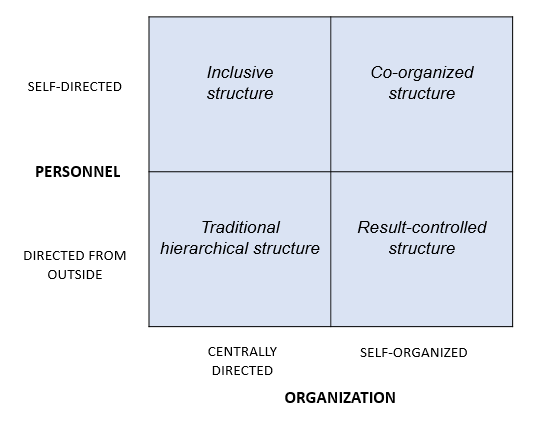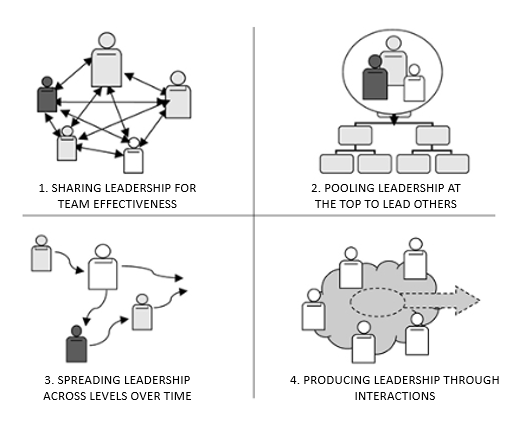Self-direction is a concept that has long existed in the business landscape, and its effect in teams has been a research subject for a long time. But what kind of framework is needed to support individual employee’s self-direction? Using an IT unit as an example, I am describing what kind of self-direction practices support the employee’s self-direction and what kind of issues hindered self-directed working. Furthermore, I will introduce how self-direction improves the daily work quality.
Why are we talking about self-direction?
There is not a common interpretation on what the self-direction means specifically, but on a general understanding it goes as follows; a person’s ability to perform without external guidance & control (Martela and Jarenko, 2017).
The research subject is new because changes have happened in the world of business; technology has advanced to become knowledge-intensive and dynamic, allowing industries to innovate solutions previously unable to have been developed (Muthusamy at al., 2005). Work life has changed because of modernized thinking, which is leading organizations to meet new challenges in employee satisfaction. The emergence of measurement of self-direction is currently not on companies’ priority lists, as there is a lack of tools and promotion for doing this. However, this is the topic of the near future (Koutonen, 2020).
Past research about the concept has led to opening a few questions:
- What business and individual based information is essential for enabling self-direction in a company?
- Are individual or company performance used as the model for organizational operation?
- Is individual information relevant for the company, and will it have effect between company chains?
- What practices support self-direction?
- What tools are required to support self-direction? (Koutonen, 2020.)
Self-direction is one emerging concept in the changing work industry. New generations want to experience work as meaningful (Kiskonen, 2018). Organizations have difficulties in predicting or measuring an employee’s attitude towards own work and what possible consequences might occur (Lal, 2008); the lack of knowledge about self-direction could affect negatively on organizational strategies if not taken into account during re-evaluation of these.
To know what information affects individual work performance, meaningfulness and evaluation is valuable when improving strategies, or when creating new ones. The information can lead to employees performing their jobs more self-directed and successfully. Organizations can utilize this information for company success by knowing how and what relevant business information visibility could help and motivate an employee to perform the job more self-directed and successfully, and if information visibility will affect self-direction’s usage and enrichment. So, how does an organization find out this, at least on the first look, non-tangible information?
Subordinates, speak up! Management, take notes.
The conceptual framework I built for my thesis (there were no existing ones to be found) aimed to find out how to assess current self-direction practices in an organization or unit by tackling multiple topics that eventually formed the basis for developing a self-direction supportive framework. Analysis of current values helped establishing a scope for the framework, current best practices established the themes, and current solutions established what utilization capabilities the framework could be used for.
The conceptual framework helped developing the questions to evaluate a subject area’s (in my case, an IT unit) current self-direction practices. For example, two major factors in practicing self-direction were discussed from the individual employee’s perspective: what organization model, and what leadership model, do you identify following?

Image 1: Martela and Jarenko (2017)

Image 2: Denis at al. (2012)
Utilizing the conceptual framework to evaluate current self-direction practices will definitely vary depending on the research subject, but following areas were identified in the IT unit I analyzed: self-direction, autonomy, creative thinking, and independent decision-making in daily work is highly supported, while self-directed working is hindered by an overall lack of responsibility, documentation, workflows, and CRM transparency. In addition, guidelines for practicing additional voluntary self-direction supportive organizational thinking is missing.
After so much research, it was uplifting to allow the employee to talk. As the results in the Thesis study demonstrated, what might be defined in the organization may not be what the employee perceives. Managers: allow the employee to identify how things work according to how one perceives it, not according to company guidelines. It might save much trouble to not assume that everything is clearly communicated and followed.
What to do with the established strengths and weaknesses?
Having an open mind about what kind of a framework should be developed, and eventually implemented, certainly benefits from having an S&Ws-analysis based on honest answers. As my IT unit current state analysis revealed, promoting self-direction should be further a focus area, while reacting to changes in the business environment should be an area for improvement. With clear evidence, developing a voluntary self-direction supportive change enablement framework was rapidly decided between company management and myself.
My Master’s Thesis (Koutonen, 2020) demonstrates the development of the change enablement framework in detail, as with clear motivations for reasoning its existence. The framework has not yet been implemented in the IT unit, but is expected to be done in 2021, Q1.
If implemented, the change enablement framework could improve the daily work quality and business environment in the IT unit. Scattered practices have always existed in roles and responsibilities, documentation, workflows, and internal and customer business environment transparency. The framework could help in creating a cohesive and professional working environment in the IT unit, which leads to more self-directed capabilities in own working.
By developing and following a self-direction supportive framework, an organization could re-evaluate organizational strategies with visible outcomes of the implemented framework and utilize the information for company success by evaluating how and what information visibility could help and motivate the employee to perform own job more self-directed and successfully.
Self-direction is a concept that has long existed in the business landscape, and its effect in teams has been a research subject for a long time. I hope that my Master’s Thesis study will be one of many research subjects about the concept’s effect from an individual’s perspective in a team.
About the author

Olli Koutonen works as an IT Consultant for an IT-house that specializes in providing customers technical environments in a rapidly evolving digital landscape. He has over five years of experience in multi-language customer-oriented services in the IT industry, from customer service & management positions to specialized consulting services.
References
Denis, J-L., Langley, A. and Sergi, V. (2012). Leadership in the Plural. The Academy of Management Annals, Vol. 6, No. 1. 211-283. [online] [Accessed 1 June 2020]
Kiskonen, L. (2018). Itseohjautuvuus Työhyvinvoinnin Tukena: Varhaiskasvattajien Näkemyksiä Itseohjautuvuudesta Osana Työtään. [PDF] Metropolia University of Applied Sciences, Department of Social Services, Myllypuro. Bachelor’s Thesis. [Accessed 18 November 2019]
Koutonen, O. (2020). Developing a Framework Supporting the Employee’s Self-direction in the Information Technology Unit. Metropolia University of Applied Sciences, Department of Business Informatics, Myllypuro. Master’s Thesis.
Lal, H. (2008). Organizational Excellence Through Total Quality Management: A Practical Approach. ISBN: 978-81-224-2643-4. New Age International Publishers.
Martela, F. and Jarenko. K. (2017). Itseohjautuvuus: Miten Organisoitua Tulevaisuudessa? ISBN: 978-952-14-3041-1. Alma Talent.
Muthusamy, S., Wheeler, J. and Simmons, B. (2005). Self-managing Work Teams: Enhancing Organizational Innovativeness. Organization Development Journal, Vol. 23, Iss. 3.









Ei kommentteja